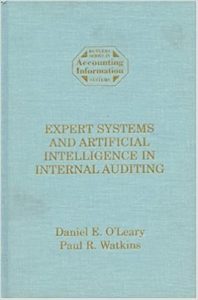 This monograph provides an analysis of the use of expert systems (ES) and artificial intelligence (AI) by internal auditors, focusing on some of the key issues in verification and validation of expert systems. The authors describe a survey of over 3,000 internal auditors and their uses of expert systems in internal auditing practice, summarize the previous literature on AI/ES in auditing, and analyze a variety of audit and security issues for AI/ES systems.
This monograph provides an analysis of the use of expert systems (ES) and artificial intelligence (AI) by internal auditors, focusing on some of the key issues in verification and validation of expert systems. The authors describe a survey of over 3,000 internal auditors and their uses of expert systems in internal auditing practice, summarize the previous literature on AI/ES in auditing, and analyze a variety of audit and security issues for AI/ES systems.
Throughout, the book is grounded in economics, social exchange theory, and AI/ES technology. The descriptive investigation of the survey data forms the core of the study. There are three distinct ‘views’ of the data: the multiple roles of internal auditors; technology adoption of expert systems by internal auditors; and the impact of AI/ES adoption on status of internal auditors. The book includes a review of the literature of AI/ES in auditing and internal auditing, a summary of some key interviews used to structure the survey (which are the only such discussions available on a number of different auditing systems), and an investigation of some audit and security issues associated with expert systems and artificial intelligence systems.
The authors investigate the roles of internal auditors and gather information about the components of each of these roles. The book examines factors that appear to influence whether AI/ES will be adopted within an organization. The implementation of expert systems as a vehicle for changing the organizational status of internal auditors is also analyzed.
